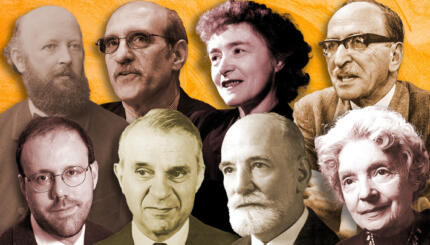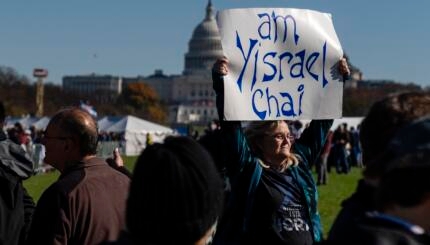Jewish authors–authors who are Jewish, which is not quite the same thing–have made a huge splash in this century. Of course there are Bellow, Roth, and Malamud. These are our most celebrated Jewish writers. They have been observers of the growing distance between first- and second-generation Jews, between flight and return, and the grating of the new world against the old. Their works–of which we, as American Jews, are very proud–frequently bash the mores, the limitations, the restrictions of Jewish life.
We have grown used to these criticisms and mostly let them roll off our backs. But you have only to pick one theme–the Jewish male and the shiksa, for example–to see in all their work a Jewish guilt, a deliberate rejection of things Jewish, a glamorization of the stranger and a ridiculing of the familiar, repeated and played out again and again. These three writers show us the fierce, striving, ambitious, nonreligious, nontraditional, and for the most part, nonknowledgeable but smartass Jew who knows his Kierkegaard but not his Rambam (Maimonides). In these writers, who emerged in the ’50s, ’60s, and ’70s, we have the voice of the American Jew moving into the mainstream, Yiddish jokes, sad stories, pressuring mothers, self-sacrificing mothers, beautiful blondes, pain of the soul, Jewish references everywhere, smart Jewish boys who always know the answers, and anti-Semitism.
It’s not just Malamud, Bellow, and Roth; it’s also Herbert Gold and Joseph Heller and Norman Mailer and Arthur Miller and Woody Allen. Take Malamud’s “The Magic Barrel.” This story is many things and can be read many ways, but to me it is the emblematic story of assimilation. Leo Finkle is a rabbinical student at the Jewish Theological Seminary in New York. He needs a wife. His Old World parents want to arrange a marriage for him, but he wants to fall in love, American style. Alas, he’s too shy to find a wife on his own, and eventually he resorts to calling the matchmaker.
The matchmaker suggests several suitable women, but Leo rejects them. At last he catches sight of a picture of a woman who draws him. She turns out to be the matchmaker’s own fallen, miserable daughter. He cannot help himself. This marriage will lead to pain, to love. In this little story Malamud marks a shift from communal life into the difficult, often painful life that is a simultaneous celebration and damnation of the individual soul, America’s gift and its curse.
That chapter is closed. The scene has changed. The freedom to love whom one pleases has become commonplace. There is a big question about whether this is for the better or the worse, both from a communal point of view and a personal one. In any event, today’s Jewish writers come from a very different place. Well, not such a different place after all. Cynthia Ozick has been off the beaten track all along. She has used the Jewish tradition in her work, she has spoken, not as a Jew in a hurry to be someone else, but as a Jew rich and ripe in Jewish imagery, Jewish life, Jewish issues. Hers was a lonely voice for a long time, a creator, in fact, of the Jewish literary voice in America. Is it nothing but coincidence that she should have been the lone woman among the brighter stars? Well yes, there’s Chaim Potok. His affection toward and understanding of the Jewish world is stronger than that of Mailer and Miller and the rest. He, too, has been read outside the Jewish circle, conveying to America an image of the inner life of Jews, but his work is more sentimental, sweeter, than the other Jewish critics–and he has had few followers.
But a new generation of Jewish writers have joined Ozick and Potok. They still have complaints–writers always do–but these new Jewish writers are not hurtling toward assimilation, at least not in the same way. Take the works of Allegra Goodman, Aryeh Lev Stollman, Pearl Abraham, Ehud Havazelet, Daphne Merkin, Nathan Englander, and the nonfiction but almost-fiction of Leon Wieseltier, and what we see is another kind of Jewish voice. This one was raised within the Jewish tradition, and although it has serious objections to how it was informed, it does not mumble out of a Jewish vacuum. These young Jewish writers, like Ozick before them, speak from a Jewish vocabulary. Their voices are not ethnic so much as traditional, source filled, and full of their own identity. Religion and tradition may be challenged or attacked, but only the way the son or daughter in a family will and the way a writer must–not vaguely, but precisely.
We are also hearing now from gay Jews who were raised within the tradition, and their work, too, is deeply Jewish but still deeply gay. This is the remarkable contribution of Aryeh Lev Stollman (The Far Euphrates), who may prove to be an artist of the first order, our finest offering. This minority voice, a homosexual voice, carrying with it many layers of Jewish knowledge steeped in Jewish tradition, presents us with a large change. While his time is the present, he, like the others in this new group of Jewish writers, is linked to Isaac Bashevis Singer and S.Y. Agnon far more firmly than to Hemingway or Fitzgerald, Updike or Marquand. Nathan Englander, a remarkable writer, seems to take his voice from Isaac Babel, and I.J. Singer, rather than Saroyan or Steinbeck. Just as Aryeh Lev Stollman takes gay sexuality as a given, so does Jonathan Rosen (Eve’s Apple: A Novel) take Jewish life as a given, neither bucking against it nor underlining it as an unnatural condition. For this group of writers, it is the most natural condition of all, like breathing and sleeping and sex.
Excerpted from
Moment Magazine
(October 1999) and reprinted with permission of the author.


